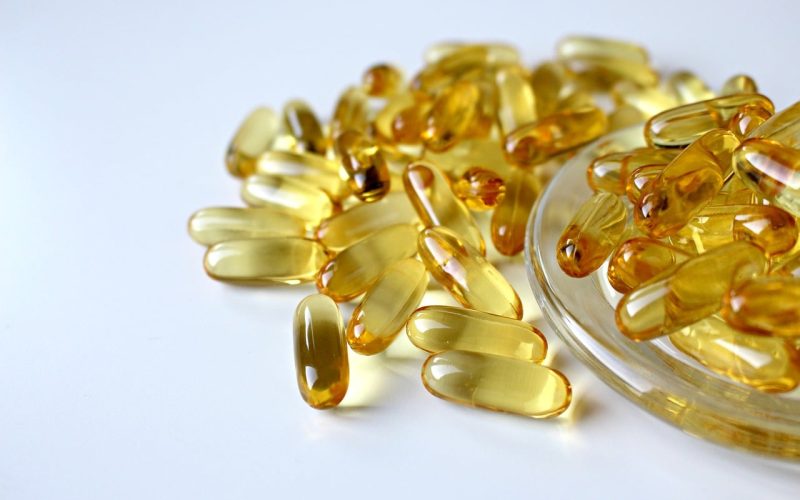Without question, vegetarian and vegan diets are becoming more and more popular.
You risk depriving yourself of some micronutrients if you cut out specific food types from your diet.
Finding suitable vegan substitutions and alternatives is crucial to maintain your health and satisfy your dietary requirements.
Omega-3 fatty acids are essential for skin, eyes, and brain health. Nonvegans may obtain fatty acids from meals like fish, including salmon and sardines, to mention just two.
Vegans must explore elsewhere for substitutes for fish oil as such sources are not an option for them.
What is Fish Oil?
Fish oils are derived and processed from varieties of fish. It contains significant amounts of the omega-3 fatty acids docosahexaenoic acid (DHA) and eicosapentaenoic acid (EPA) (DHA).
Fish oil’s omega-3 fatty acid content appears to be the source of its advantages. Fish, including mackerel, herring, tuna, and salmon, are particularly high in these oils.
As the name suggests, fish tissue is used to make fish oil. Some fish have a very high fat content compared to others.
Whiter fish, such as cod, haddock, or bass, on the other hand, have lower concentrations of fish oil in their tissues and are hence not as excellent providers of omega-3.
List of Substitutes for Fish Oil
When looking for substitutes for fish oil, it’s important to remember that it is a fantastic source of omega-3 fatty acids, which is necessary for every person.
Therefore, the substitutes for fish oil must have enough quantity of nutritional value or more:
Chia seeds
This well-liked health food is known for having high levels of fiber and protein. It’s also a great plant-based source of ALA omega-3 fatty acids, making it a fantastic substitute for fish oil, which many people are unaware of.
Studies have shown that chia seeds when included in a balanced diet, may reduce the chance of developing chronic diseases due to their omega-3, fiber, and protein content.
In one trial of adults with metabolic syndrome, a diet high in chia seeds, nopal, soy protein, and oats was reported to reduce participants’ blood lipids, glucose intolerance, and inflammatory markers.
Chia seeds in your diet can also reduce blood triglycerides, raise good HDL cholesterol, and reduce inflammatory indicators, according to 2007 animal research. To increase your consumption, you may add chia seeds to salads, smoothies, or yogurt.
Canola Oil
Canola oil, which comes from the rapeseed plant and is another source of ALA with omega-6 and omega-3 fatty acids, can also be used as a substitute for fish oil.
Additionally, it has a lot of monounsaturated fats, which might reduce your chance of developing heart disease.
One tablespoon of canola oil contains ten percent of the recommended daily intake of ALA. However, because this oil is very calorie-rich, it should only be taken in moderation.
Flaxseed
Ripe flaxseed is used to make flaxseed oil, which is then cold-pressed to release the oil. Linseed oil is another name for it. Recently, it has attracted significant interest as a workable vegan substitute for fish oil.
It comes in liquid and pill form and has a significant alpha-linolenic acid (ALA) level. It is also among the most often used substitutes for fish oil.
Flaxseed oil also contains the omega-3 fatty acids eicosapentaenoic acid (EPA) and docosahexaenoic acid (DHA).
Additionally, it contains alpha-linolenic acid (ALA), a plant-based omega-3 acid that improves your health in several ways.
According to different research, it can help reduce blood pressure, especially in people with high blood pressure.
Brussels Sprouts
This vegetable is an excellent source of omega-3 fatty acids and has high vitamin C, vitamin K, and fiber levels.
One study indicated that increasing one’s intake of cruciferous vegetables like Brussels sprouts can reduce one’s risk of heart disease by 16% and be an effective substitute for fish oils.
In contrast, cooked Brussels sprouts contain three times the amount, with each half-cup (78 grams) serving containing 135 mg of omega-3 fatty acids (13Trusted Source).
Brussels sprouts are a nutritious and scrumptious side dish for any dinner. They taste great: roasted, steamed, blanched, or stir-fried.
Hemp Seeds
Hemp seeds are high in protein, zinc, magnesium, and omega-3 fatty acids and contain roughly 30% oil.
According to animal research, the omega-3 fatty acids in hemp seeds can improve heart health by lowering the risk of blood clots and speeding up the healing process following a heart attack.
To increase your consumption, include these seeds in your diet in yogurt or a smoothie.
Algae
Fish consume algae to obtain the omega-3 DHA and EPA, which they do not naturally synthesize. By using algae as a substitute for fish oil, you will obtain the most essential nutrients in fish oils straight from their source.
By doing this, you will obtain a purer, more concentrated product and all the advantages of fish oil without any disadvantages.
Due to their position at the base of the food chain, some claim that algae have a lower chance of carrying pollutants than most fish oil supplements. To add algae to your diet, consume nori, seaweed, chlorella, and spirulina.
Walnuts
Walnuts are a fantastic source of ALA, good fats, and omega-3 fatty acids. In actuality, the weight of these nuts is around 65 percent fat.
Due to their high omega-3 fatty acid content, walnuts have been shown in several animal studies to assist in promoting brain function.
To improve your ALA consumption, include walnuts in your homemade granola, cereal, or yogurt.
And just like other foods high in ALA, you’ll need to eat more to reap the same advantages as fish oil. However, doing this is still rather simple.
Walnuts may be toasted, sprinkled on top of savory foods like pesto spaghetti, and added to salads, cereal, and porridge.
Perilla Oil
Perilla oil is made from the roasted seeds of the Perilla frutescens plant. It has long been used as a condiment to give savory meals a nutty taste.
Use perilla oil as a flavor enhancer or dressing as one of the best substitutes for fish oil. This is because heat-oxidizing oils rich in polyunsaturated fats produce dangerous free radicals that can lead to illness.
Twenty senior volunteers in a study had their blood levels of ALA quadrupled when they switched from soybean to perilla oil. In the long run, it also caused levels of EPA and DHA to grow.
Algal Oil
Different species of algae, from tiny single-celled microalgae to enormous seaweed, are used to make different types of oil. These green sea plants are among the rare and finest vegan sources of DHA and EPA and one of the only plant-based sources of algal oil.
Microalgae, in particular, have significant levels of EPA and DHA. These creatures supply the fatty acids that make up the body composition of fatty fish.
Algal oil supplements can be found at most pharmacies. To obtain a balanced serving of fats, add them in liquid form to smoothies or your favorite drinks.
According to certain research, algae oil has similar nutritional availability to seafood in terms of EPA and DHA. Supplements with algae oil typically include 400–500 mg of EPA and DHA.
Echium Seed Oil
In the Western world, echium seed oil from the echium plant has long been mostly unknown. However, its profile has recently increased, and for a good cause.
A research team recently investigated 30 different types of seeds and discovered that echium seeds had the greatest concentration of total omega-3 fatty acids.
Olive Oil
Olive oil has long been believed to be an acceptable supply of omega-3, albeit just ALA, and very good for our overall health.
It is noteworthy since most individuals have no trouble digesting olive oil. Olive oil’s omega-3 fatty acids have been specifically linked to heart health and a lower incidence of gallstone formation. Additionally, it is a fantastic source of vitamin D3.





